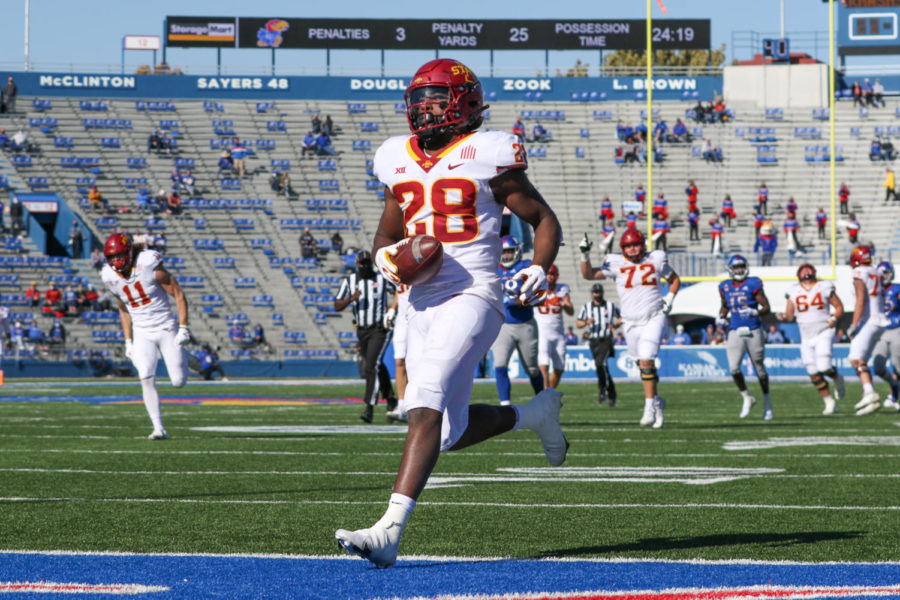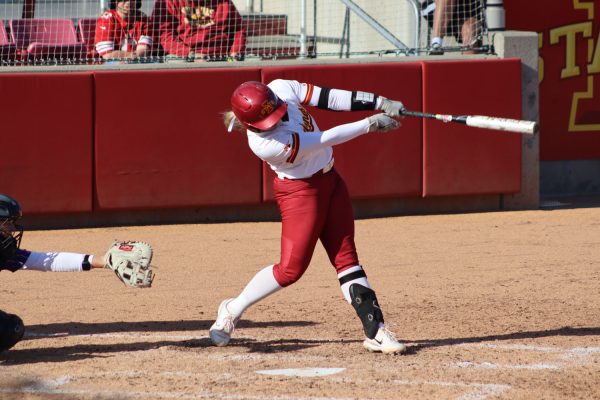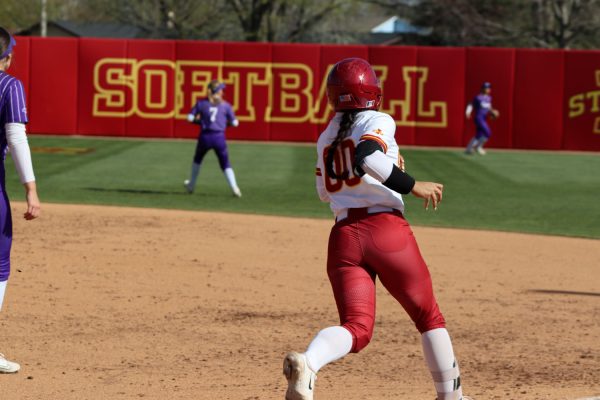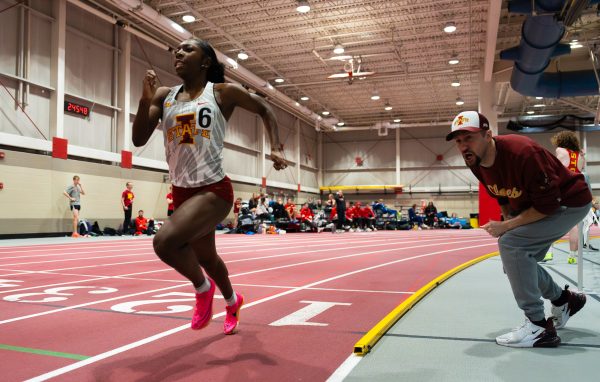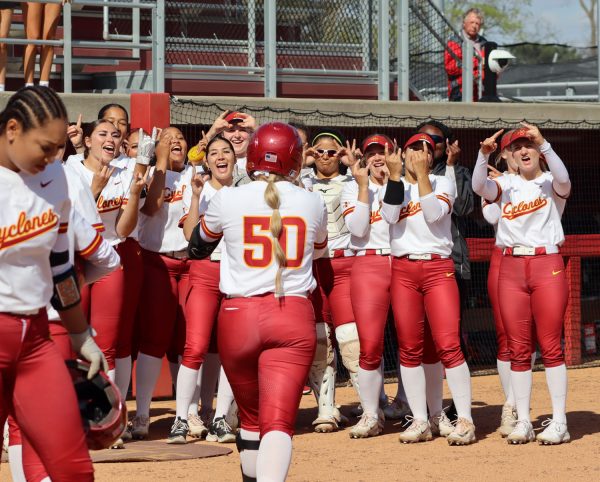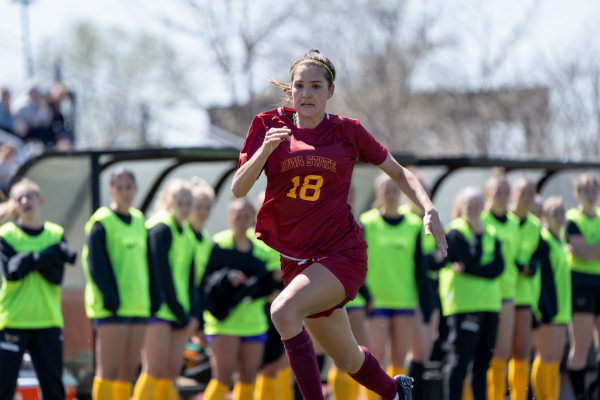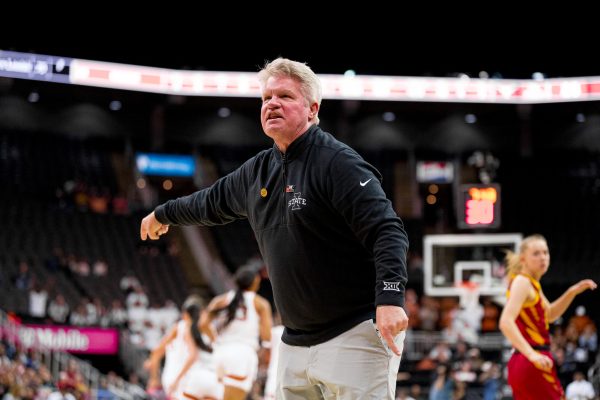Martin: It’s time to start discussing Breece Hall’s Heisman resume
November 5, 2020
It’s actually quite remarkable we’ve gotten to this point of the 2020 college football season. Outside of Wisconsin in the Big Ten, Baylor in the Big 12, along with a small handful of Southeastern Conference schools, we have gone basically postponement-free.
Kudos to all involved, from players to coaches to medical personnel, it has taken a Titanic-sized effort to pull this off.
You know what else is remarkable? An Iowa State player is right in the thick of the Heisman Trophy race.
It has been the 17th-ranked Cyclones best player every week; it’s the one who has eclipsed the century mark of rushing yards in all six games; it’s the most exciting player to watch whenever he touches the ball.
I’m talking about true sophomore running back Breece Hall.
It’s time we start taking a look at why he needs to be a prominent talking point in the race for the greatest individual trophy in college football.
When the season started, there were three running backs, at least in my eyes, we can look at and say “Yep, they’re elite.” Alabama’s Najee Harris, Clemson’s Travis Etienne and Oklahoma State’s Chuba Hubbard made up that trifecta.
And it’s hard to argue against them. All three were considered first-round draft picks in 2021 at one point, now maybe Hubbard falls into early round two while Etienne and Harris are likely staying in that opening round.
Where was Hall in these hierarchy rankings? I doubt as high as fourth, but certainly a lot had him inside the top 10.
Now? There’s no doubt he’s one of the best running backs in Division I.
And the numbers back that up.
Hall is fifth in yards per carry at 6.72, though among running backs that have played in at least five games, he’d rank fourth. He’s second in rushing yards at 901, 20 yards behind Sincere McCormick from University of Texas at San Antonio.
His 11 rushing touchdowns are tied for second in the nation with North Carolina’s Javonte Williams, three behind Harris’ 14.
In fact, Hall is ahead of Harris, Etienne and Hubbard in every major statistical rushing category except in the aforementioned category of rushing scores.
All seem to point in the direction of Hall gaining traction as the most elite running back in the country.
“I’m a three-down back, I never have to come off the field,” Hall said. “I can catch, I can block. There’s a lot of great running backs in the country… no disrespect to them, but just right now, I feel like I’m the best back in college football.”
While Hall should be discussed more in the Heisman race, can he win it?
Honestly, probably not.
Look, the simple fact is this award is quarterback-driven. Only three running backs have won the Heisman since 2000, two if you count Reggie Bush having his vacated.
Alabama alumni Mark Ingram (2009) and Derrick Henry (2015) are the only two backs to win the award.
Ingram’s stats in 2009: 1,658 rushing yards with 17 touchdowns plus another 334 yards through the air with three additional scores. He averaged 118.4 yards per game and 6.1 yards per carry.
Henry’s stats in 2015: 2,219 yards with 28 touchdowns, averaging 148 yards per game and 5.6 yards per carry.
Hall easily draws more of a comparison with Ingram than Henry, strictly because of size and Hall’s ability to catch the ball out of the backfield. Henry was dominant in college; Hall isn’t dominant, he’s just really good.
As long as Trevor Lawrence, the Clemson quarterback who is currently in COVID-19 quarantine, and Ohio State quarterback Justin Fields still play every Saturday for the rest of this year, they’ll be the front-runners for the Heisman.
Still, Hall deserves to have his name in the race. It’s clear he is in the driver’s seat for the best running back in the country.

